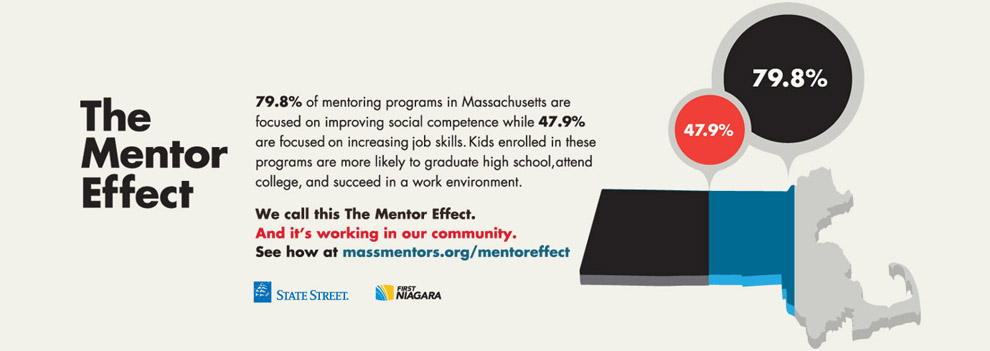As part of our 20 Challenges in 2012 initiative to celebrate Mass Mentoring’s 20th anniversary, we are releasing a series of challenges to address key goals of mentoring in Massachusetts. Goal six is 20 ways that communities grow with mentoring. The Highland Street Corps Ambassadors of Mentoring have researched 20 ways that mentoring provides positive social benefits that strengthen schools, families and communities. You can read more about their findings here.
This guest post is from Julie Muller, an Ambassador at Big Brothers Big Sisters of Massachusetts Bay.
 In mentoring relationships, there are many tangible improvements that a mentee can see, such as improvement in grades or improved behavior in school. Mentoring, however, has shown that it can improve another aspect of a mentee’s life: his or her relationship with parents.
In mentoring relationships, there are many tangible improvements that a mentee can see, such as improvement in grades or improved behavior in school. Mentoring, however, has shown that it can improve another aspect of a mentee’s life: his or her relationship with parents.
Within the mentoring field, research has illustrated the impact of mentoring relationships on youth’s family relationships. According to Lisa Bottomley, mentoring has numerous outcomes that can include improved intimacy, communication, and trust between youth and parents. Families can benefit from a mentoring relationship in many ways, as it often decreases stressors for the family and also teaches the youth more effective communication skills that help family dynamics.
The report, Making a Difference: An Impact Study on Big Brothers Big Sisters found that the quality of a youth’s relationship with his or her custodial parent increased following program participation, especially among white Little Brothers.
Big Brothers Big Sisters found through their Youth Outcome Survey that 72.6% of community-based matches saw improvement in parental trust and 65.6% of youth in school based matches saw improvement. Community-based matches saw improvement after one year and school-based matches saw improvement in parental trust after two years
Mentoring can also change the way families view the mentee as they gain different relationship skills throughout the match, which enhances relationships. Developing a relationship with an adult who is not family related can have a positive effect on a mentee’s ability to communicate. It can increase self-esteem for the mentee, which could directly translate into better communication between mentee and parents.
Another important factor is longevity of the mentoring relationship. Having a sustainable mentoring relationship is integral in being able to see positive results from the match. Data from Big Brothers Big Sisters Youth Outcome Survey show that youth in two-year matches saw greater improvements than youth in one-year matches. Many mentees come from an at-risk home and have yet to experience a sustainable relationship with an adult. Studies have shown that mentors can have a detrimental effect on the mentee if it lasts less than a year. To be able to improve familial relationships, a match must be sustainable and contain an open communication throughout all match parties.
Improving relationships within the youth’s life, research has shown, can lead to improvement in academics (including higher graduation rates) and a decrease in risky behaviors, according to the Youth Outcome Survey. These improvements can benefit the families of our communities and, in turn, our communities themselves.
Source: Strengthening Youth-Parent Relationships Through Mentoring By: Lisa Bottomley. Michigan State University Extension (2012). Retrieved from: Michigan State University Extension
Source: Making a Difference: An Impact Study of Big Brothers Big Sisters By: Joseph P. Tierney, Jean Baldwin Grossman, with Nancy L. Resch (1995). Retrieved from: Making a Difference
Source: Big Brothers Big Sisters’ Youth Outcome Report: Executive Summary, January 2012. Retrieved from: Big Brothers Big Sisters’ Youth Outcome Report

Pingback: How Mentoring Breaks the Cycle and Changes the Future for America’s Young Black Men - The Good Men Project